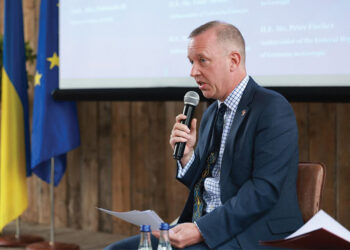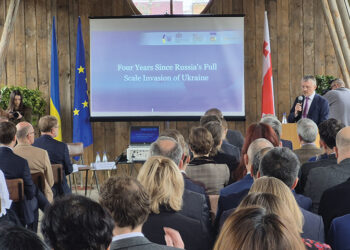By Prof. Vladimer Papava, Senior Research Fellow, Rondell Foundation
Hopefully, readers will agree that the words of protagonist Hamlet, from William Shakespeare’s famous tragedy ‘Hamlet,’ about being or not being, best reflects the reality in which every person has found themselves since 2020 as a result of the COVID-19 pandemic. Unlike in 2020, though, different types of vaccines have been developed for 2021, the possibility of their mass use leading to the expectation that the global pandemic will soon come to a real end.
Yet, the development of COVID-19 vaccines brought about new problems. From the very beginning of the vaccination process, the ethical side of vaccination became especially acute when age and professional priorities had to be considered.
Alongside this, the fact that vaccines were unequally available to rich, developed, and developing countries became quickly apparent. Although, following the principle of solidarity, some wealthy countries and international organizations began to distribute vaccines to relatively low-income countries free of charge, the question remains: how to vaccinate the populations of all countries?
Against the background of the vaccination process, a number of countries have fully or at least partially lifted the imposed restrictions, a move which immediately reflected on the improvement of the economic situation. Vaccination therefore allows the economy to emerge from the crisis, thus ending the unfortunate situation wherein the economy has become a hostage of medicine.
The importance of vaccination is precipitated by the fact that collective immunity will only form when 80 percent of the world’s population is vaccinated, which is expected to be achieved in 2023 or 2024, although acceleration of this process has not been ruled out.
Even though different types of vaccines have been developed, making it easier for people to choose when available, the issue of low trust in these vaccines remains a major problem. And if a significant portion of the population has no confidence in the vaccines, then it will be impossible to overcome the COVID-19 pandemic through them. In other words, as it turns out, the existence of a vaccine in and of itself is not necessarily a panacea.
Vaccines have been available in Georgia since the spring of 2021, while from July the population was given the choice to get vaccinated with four vaccines, made using a variety of technologies: Pfizer-BioNTech, Oxford-AstraZeneca, Sinopharm, and Sinovac. Despite this opportunity, there was no rush seen to get vaccinated. A poll conducted by the National Democratic Institute on July 13-25 showed that 47 percent of respondents did not want to be vaccinated with any vaccine. It is noteworthy that as soon as the number of daily infections and deaths increased on average by 3-4 fold in August, the daily vaccination rate also rose, by an average of 7-8 times. This can only be explained by the fear factor.
Notably, the popular anti-vaxxer movement, which is based on superstition, preceded the vaccination process. Of particular importance in this regard is the call of Pope Francis for people to get vaccinated in order to save lives. The Pope called vaccination against coronavirus an “ethical obligation.” His position should be shared by the leaders of different religions and denominations, as it would contribute to a significant weakening of the anti-vaxxer movement.
In this situation, the implementation of universal mandatory vaccination becomes relevant. Yet, in a number of countries, this potential move was interpreted as a restriction of human freedom, which is why the idea was promptly rejected.
As is well known, the freedom of one person ends where the freedom of another begins. According to popular belief, in the context of the COVID-19 pandemic, one person’s free choice of whether to be vaccinated with the appropriate vaccine depends solely on how contagious the virus is to another person. This argument is certainly not flawless, as even a vaccinated person can catch COVID-19 (although this is less likely than for an unvaccinated person) and, although the virus is usually easily overcome by those vaccinated, there is still the risk of potentially infecting other people.
A more noteworthy topic is what economists call “opportunity cost.” In particular, in assessing the opportunity cost of vaccination, it must be borne in mind that the probability of being infected with COVID-19 as an unvaccinated person is much higher than that of a vaccinated person. In particular, 2.85 percent of those hospitalized in Georgia with COVID-19 symptoms have been vaccinated once, while the rate of hospitalization in those who received two shots of vaccine is 2.13 percent. This means more than 95 percent of hospitalized Georgians are unvaccinated. Those vaccinated with one dose constitute only 1 percent of intensive care patients, while those with two shots make up just 0.3 percent.
In Georgia, the average cost of treating one patient in a hospital is $603, which does not include the cost of setting up oxygen supplies and training medical staff. In comparison, regarding the price of vaccines, one dose of Pfizer-BioNTech is $19.50, Oxford-AstraZeneca $2.15, Sinovac $60, and Sinopharm varying from $19 to $36.
It is not really difficult to calculate that vaccination with two shots of the most expensive vaccine in Georgia, Sinovac, at $120 per person, with a 95 percent probability (since, as mentioned above, 95 percent of patients hospitalized in Georgia did not have any vaccination at all), will save at least $483 ($603 – $120), while a two-dose vaccination with the cheapest Oxford-AstraZeneca vaccine will save at least $598.7 ($603 – $4.30).
The opportunity cost of vaccination is even higher in economically developed countries. In the U.S., for example, treatment of one patient in a clinic varies from an average of $51,000 to $78,000.
Therefore, an unvaccinated person is not only more susceptible to infection, but their hospital treatment is also much more expensive than that of a vaccinated person. And this, in view of limited financial resources, directly affects the right of any person to receive full-fledged hospital services if needed.
There are numerous cases of restricting human freedom in the aim of ensuring the freedom of others. One of the most obvious examples is the incarceration of a perpetrator of a crime in order to protect the safety of other members of society. There is a much simpler example when the use of seat belts became mandatory at the legislative level to protect people in road accidents. The conclusion from this is simple: the COVID-19 vaccination should also become compulsory.
At the initial stage, it may be easier to introduce compulsory vaccination for those whose professions require them to interact with a relatively large group of people (e.g., medical workers, teachers and professors, police officers, military, etc.). It is also advisable to admit to public places only those people who have been fully vaccinated (that is, those who have taken the required number of doses and the time necessary to develop immunity). Such an approach will make the gradual transition to universal compulsory vaccination easier.
It should also be noted that the anti-vaxxer movement has produced specific types of crime, among them making fake vaccination documents for travel purposes, and injecting harmless substances instead of vaccines. Naturally, this type of crime requires an appropriate legal response.
Exceptions to vaccination should be allowed only when vaccination is not medically recommended.
Once an effective drug for the treatment of COVID-19 is developed, the topic of universal vaccination will gain a new interpretation. But until such a drug exists, we must be oriented to facilitating, as much as possible, the transition to compulsory vaccination, in order to give an unambiguously positive answer to the Shakespearean dilemma of to be, or not to be.
Op-Ed by Prof. Vladimer Papava, Senior Research Fellow, Rondell Foundation














